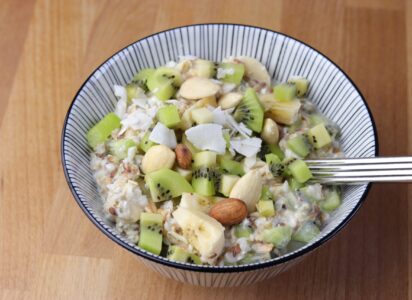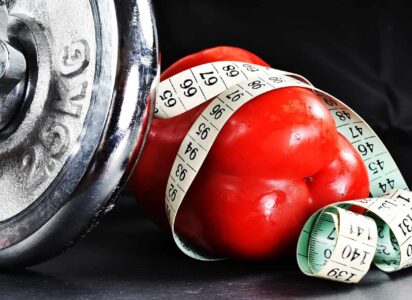“What should I eat to lose weight?” is a question commonly put to Google, nutritionists and fitness experts. To start, there’s no one size fits all approach, and you should speak to your doctor before changing your diet. We also can’t cover every detail of healthy eating in just one article, but we can offer general best practices and clarification on some areas to start answering the question of what you can eat to lose weight.
What is weight loss?
Typically, when people think about ‘weight loss’, they specifically mean fat loss. Maintaining muscle mass is essential for both daily activities and health, and it also keeps your body’s daily energy expenditure higher than if you had less muscle. This is beneficial as you’ll be burning more energy just existing and whenever you exercise, meaning if you’re eating in a calorie deficit you’ll have to reduce less and be less likely to plateau.
It’s important to note that you can’t target fat loss. If your body is in a calorie deficit, it will get energy from whatever is the easiest source in your body. Some muscle loss is an accepted side effect of weight loss, however, you can reduce the impacts of this by keeping up with strength training and making sure you’re only in a slight calorie deficit.
What is a calorie deficit?
In its simplest form, weight loss is eating less than your body is burning on a daily basis. You want to aim for a small deficit, just a few hundred calories and this can usually be achieved very easily by making a few changes or swaps to your existing diet.
Some things to remember
- There are many things, such as medication, hormones, and stress that can affect your weight which you may not be able to counteract
- Small calorie deficits will work better in the long run, as they are more sustainable and will help maintain muscle mass as much as possible
- Keep strength training for a healthy body
- Your body doesn’t know what the days of the week are. You can eat more one day and less on another to balance things out
- Calorie counting doesn’t have to be a part of weight loss
What to eat
There are no crash diets here, no dramatic all-or-nothing approaches. We can’t craft you the perfect diet through a blog post, this will have to be done on a case-by-case basis. If you want this, we recommend speaking to a team member to see who might be qualified to work with you on this.
Fibre
Dietary fibre is an often underappreciated substance, but so beneficial. It keeps you full and helps reduce blood sugar spikes. We all know about getting our five a day so make sure you’re including something fresh at all meals, or with your treats to help maintain a healthy balance. Beans, fruits and vegetables can be used as snacks, cooked into things, turned into sauces or eaten as a side dish. As long as you’ve got the whole fruit or veg in your meal (juice doesn’t count) you’re getting in some fibre. Fruit and veg also come hand-in-hand with essential vitamins and minerals, so you’re ticking off several nutritional needs in one go.
Beans, fruit and vegetables are usually low in fat and calories (provided you do not fry them or roast them in lots of oil) and bulk out your meals. That’s why eating them can help you maintain a healthy weight and keep your heart healthy.
Protein
Why does eating protein help you lose weight? Increasing the amount of protein you eat may help support weight loss by regulating certain hormones, increasing satiety (feeling full when eating) and helping you feel fuller longer, among other benefits. These benefits will reduce late-night cravings and help you feel satisfied after every meal. It’s also important to ensure you’re eating enough protein when you’re working out so you can actually see results, otherwise exercising isn’t going to pay off and you’ll end up feeling drained.
Drink plenty of water
Dehydration can make you grumpy, cause headaches and make it harder to focus or make the right decisions. Keep drinking throughout the day, and more when you work out to make sure you’re staying healthy, keep digestion working smoothly and to feel great.
Eat regularly
Our bodies get used to patterns and keeping up with a regular eating schedule is no exception. Your body will get hungry at the same times each day and ignoring this can cause you to eat too much or struggle to make balanced choices during the day.
Reduce alcohol consumption
Alcohol itself is high calorie and you’re more likely to make unhealthy choices both when you’re drinking and the morning after. Alcohol can also make you feel weaker and hangovers are not great gym motivation even on a good day. While you should enjoy yourself, if you’re drinking multiple times a week, reducing this is an obvious place to start.
Some quick tips to remember:
- Do not cut out whole food groups
- ADD healthy things to your meals or snacks, don’t take away important parts of them
- You should be enjoying your food
- Fibre and protein are your friends






